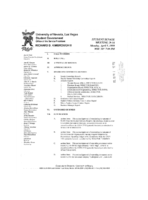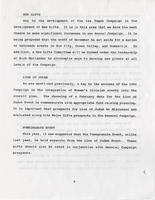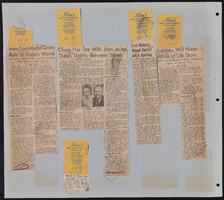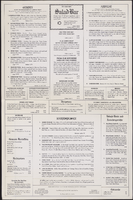Search the Special Collections and Archives Portal
Search Results
Greg Clemens Photograph Collection
Identifier
Abstract
The Greg Clemens Photograph Collection contains ten black-and-white contact sheets depicting aerial views of Las Vegas, Nevada in 1965. The contact sheets contain approximately eighty-two images showing views of McCarran International Airport, the Las Vegas Convention Center, downtown Las Vegas, and residential neighborhoods.
Archival Collection
L. Paul Mercer Papers
Identifier
Abstract
The L. Paul Mercer Papers date from 1939-1970 and consist of personal correspondence, newspaper clippings, photographs, and textile samples dyed in the Native American tradition.
Archival Collection
Paul May Papers
Identifier
Abstract
The Paul May Papers (1963-1984) contain correspondence, reports and minutes from the Nevada Legislature, campaign materials, and invitations to various events.
Archival Collection
Nevada Official Bicentennial Book Collection
Identifier
Abstract
The Nevada Official Bicentennial Book Collection (1975) contains materials related to the editing and publication of the book by the Nevada American Revolution Bicentennial Committee. It includes article submissions about Nevada history as well as a small amount of correspondence to Stanley Paher, the editor of the book.
Archival Collection
Katherine A. Spilde Papers on Native American Gaming
Identifier
Abstract
The Katherine A. Spilde Papers on Native American Gaming include materials collected by anthropologist Katherine Spilde about Native American gaming and the greater gaming industry. The materials date from 1789 to 2015, with the bulk of materials dating from 1995 to 2010. Materials dating from the eighteenth and nineteenth centuries are reproductions of key court opinions and treaties concerning Native American rights and sovereignty. The majority of the materials document Native American gaming following the passage of the 1988 Indian Gaming Regulatory Act (IGRA). The papers detail Native American gaming enterprises both on and off reservations, the socioeconomic impact of gaming, and the legislative history of Native American gaming in the United States. The papers include research and subject files created by Dr. Spilde during her employment with the National Gambling Impact Study Commission (NGISC), the National Indian Gaming Association (NIGA), and the Harvard Project on American Indian Economic Development (HPAIED). The collection includes socioeconomic reports; testimonies; correspondence; memos; press releases; photographs; audiovisual materials; promotional materials from casinos and tourist attractions; brochures; fact sheets; summaries; booklets; pamphlets; advertisements; tourism materials; journal articles; legal briefs; legislative documents; court opinions; Dr. Spilde’s notes; presentations; packets, agenda, schedules, and itineraries from conferences; periodicals; Native American and community newspapers; and newspaper articles. The collection includes materials about over one hundred federally recognized Native American nations. Also included are materials that document the socioeconomic impact of gaming, the international gaming industry, criminal activities related to gaming, advertising about gaming and casinos, lotteries, internet gaming, compulsive gambling, and bankruptcy as a result of gambling.
Archival Collection

Meeting minutes for Consolidated Student Senate University of Nevada, Las Vegas, April 05, 1999
Date
Archival Collection
Description
Text

Emmanuel Ortega oral history interview: transcript
Date
Archival Collection
Description
Oral history interview with Emmanuel Ortega conducted by Monserrath Hernandez, Maribel Estrada Calderon, Elsa Lopez, Barbara Tabach, and Laurents Bañuelos Benitez on 2019 for the Latinx Voices of Southern Nevada Oral History Project. Emmanuel Ortega was born in Artesia, California and was raised in Ciudad Juárez, Mexico before moving to El Paso, Texas with his family at the age of thirteen. In 1998 his family relocated once again from El Paso to Las Vegas, Nevada where his father joined the Carpenters Union. They settled in Green Valley and he began attending a hybrid community college and high school program allowing him to obtain college credits. He continued at the College of Southern Nevada for two more years where he was a photography major and later transferred to the University of Nevada, Las Vegas (UNLV) where he studied art history. He moved back to Las Vegas in 2011 where he began teaching at UNLV and received a PhD in Ibero-American colonial art history from the University of New Mexico in 2017. He is the co-host of the podcast "Latinos Who Lunch" where hosts discuss pop culture, art, and issues of race, sex, and gender in the Latinx community.
Text



